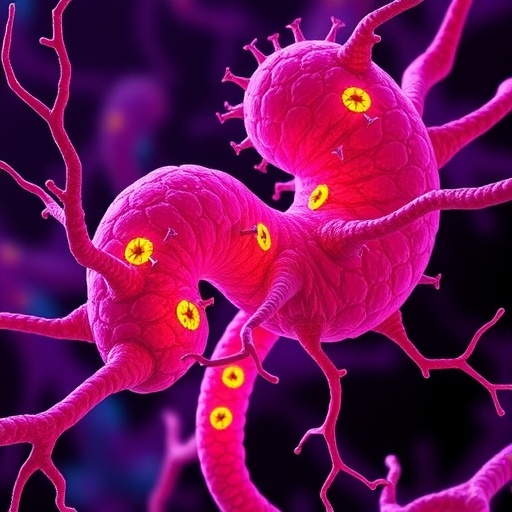In the shadowy microenvironment of pancreatic cancer, a new frontier is emerging that bridges the nervous system and tumor biology in ways previously unimagined. Researchers C. Mota Reyes, H. Friess, and I.E. Demir have unveiled a groundbreaking nexus: the role of nociceptors—specialized sensory neurons primarily known for transmitting pain signals—in actively driving pancreatic tumor progression and facilitating immune evasion. This revelation not only challenges traditional perspectives but also opens avenues for innovative therapeutic interventions in one of the deadliest malignancies.
Pancreatic cancer has long mystified scientists and clinicians alike due to its aggressive nature and poor prognosis. The intricate tumor microenvironment, rich in stromal cells, immune suppressive elements, and complex extracellular matrix components, creates a fortress that shields malignant cells from conventional therapies. Within this dense network, neural elements, once considered passive bystanders, are now recognized as dynamic participants influencing cancer biology.
Nociceptors form the frontline of the body’s sensory system, detecting harmful stimuli and triggering pain responses to alert and protect an organism. However, Mota Reyes and colleagues have uncovered that these neurons extend their influence well beyond sensory signaling. They secrete a range of neuropeptides and neurotransmitters that modulate the tumor microenvironment, impacting cellular behaviors that directly promote tumor growth and dampen immune surveillance.
Beyond promoting growth, nociceptors orchestrate a sophisticated reprogramming of immune components within the tumor landscape. The neurogenic signals modify the phenotype and function of myeloid-derived suppressor cells (MDSCs), tumor-associated macrophages (TAMs), and regulatory T cells, tipping the balance towards immune tolerance rather than antitumor immunity. This immune evasion strategy cripples the body’s natural defenses, allowing cancer cells to thrive unchecked.
Crucially, this neural influence operates in a bidirectional manner. Pancreatic tumors induce neurogenesis and nociceptor sprouting, effectively increasing their own innervation density. Such aberrant neural expansion not only heightens chronic pain experienced by patients but also amplifies the pro-tumorigenic signals within the microenvironment, creating a vicious feed-forward loop that exacerbates disease progression.
The interplay of nociceptors and pancreatic cancer also sheds light on the enigmatic relationship between pain and cancer aggressiveness. Chronic pain, a hallmark of pancreatic cancer, is often dismissed as merely symptomatic. Yet, these findings suggest that pain and its neural mediators might actively contribute to tumor biology, underscoring the need for new analgesic strategies that also target tumor-promoting neural pathways.
At the molecular level, the involvement of transient receptor potential (TRP) channels on nociceptors emerges as a crucial mediator. These ion channels detect noxious stimuli and modulate neuronal excitability. Their activation influences downstream signaling cascades that regulate cytokine production and immune cell recruitment, tying nociceptors directly to inflammatory and immunosuppressive networks within the tumor.
The current standard-of-care for pancreatic cancer is hindered by late diagnosis and intrinsic resistance. Integrating neurobiology into oncologic strategies could redefine treatment paradigms. For instance, locally delivering neurotoxin-based agents or neuromodulators to the tumor site might selectively disarm the neural contribution without systemic toxicity. Such precision medicine approaches would complement chemotherapy and immunotherapy.
Significantly, this research advocates for a more holistic view that incorporates the nervous system as an integral component of cancer ecosystems. The classical tumor-centric model is expanding to encompass neuro-immune crosstalk and neurogenic inflammation as pivotal determinants of cancer fate. This paradigm shift underscores the need for interdisciplinary research harnessing neuroscience, immunology, and oncology.
Moreover, the identification of nociceptors as key players invites reevaluation of tumor innervation patterns in other malignancies. Given the ubiquity of sensory nerves, similar mechanisms might operate in cancers of the breast, prostate, and gastrointestinal tract. Comparative studies are warranted to unravel conserved versus cancer-specific neural signaling pathways.
Beyond bench science, the clinical ramifications are profound. Monitoring neural markers in biopsy specimens or circulating neuropeptides might offer novel biomarkers for tumor aggressiveness and treatment responsiveness. Early detection of neural remodeling could serve as a prognostic indicator, guiding more personalized care for pancreatic cancer patients.
In summary, the study by Mota Reyes, Friess, and Demir spotlights nociceptors as critical conduits at the neural crossroads of pancreatic cancer. By driving both tumor progression and immune evasion through complex neuro-immune interactions, these sensory neurons rewrite the narrative of cancer pathophysiology. As research delves deeper into this uncharted territory, it holds promise for transforming the grim outlook of pancreatic cancer into one of hope and renewed scientific vigor.
The dynamic dance between nerve and tumor challenges us to rethink pain not just as a symptom but as a mediator in the cancer battle. Targeting this neural dialogue may well be the key to unlocking new therapeutic breakthroughs in a disease desperately in need of them. As the field advances, interdisciplinary collaboration and innovative clinical trials will be paramount to translate these insights from neural circuits to lifesaving treatments.
Subject of Research: Neural mechanisms underlying pancreatic cancer progression and immune evasion driven by nociceptors.
Article Title: Neural crossroads of pancreatic cancer: how nociceptors drive tumor progression and immune evasion.
Article References:
Mota Reyes, C., Friess, H. & Demir, I.E. Neural crossroads of pancreatic cancer: how nociceptors drive tumor progression and immune evasion. Cell Res (2025). https://doi.org/10.1038/s41422-025-01124-5
Image Credits: AI Generated
Tags: aggressive nature of pancreatic cancerimmune evasion mechanisms in cancerimmune suppressive elements in tumorsneuropeptides and cancer growthnociceptors in pancreatic cancerpain signaling and cancer progressionpancreatic cancer research breakthroughsrole of nervous system in cancersensory neurons and tumor biologystromal cells in pancreatic tumorstherapeutic interventions for pancreatic cancertumor microenvironment and nociceptors





